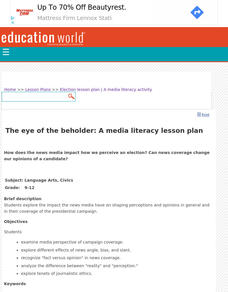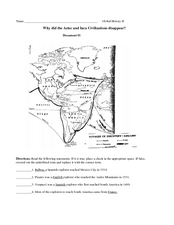Curated OER
Is It Ethical to Eat Meat?
Have your class join a blog about whether or not eating meat is good for you. They'll read several passages regarding meat processing and consumption, then they post what they think. There are six critical-thinking prompts to help them...
Curated OER
Practice Book O
Whether you need resources for reading comprehension, literary analysis, phonics, vocabulary, or text features, an extensive packet of worksheets is sure to fit your needs. Based on a fifth-grade curriculum but applicable to any level of...
Curated OER
Narrative Writing
Are you the oldest in your family? The youngest? The middlest? How do you feel about your place in your family? After reading such stories as My Rotten, Redheaded Older Brother by Patricia Polacco and Tales of a Fourth Grade Nothing by...
Serendip
Golden Rice – Evaluating the Pros and Cons
More than half the world's population eats rice as a daily staple ... imagine if that rice could prevent illness. Scientists genetically engineered rice to include vitamin A for just that purpose. However, room for debate still exists....
K12 Reader
Import/Export
The reading passage here uses the example of the American colonies to introduce imports and exports. After reading the text, class members respond to five questions, which require pupils to find facts in the text and form opinions about...
Curated OER
Lead Critical Reading
Students read opposing views on the lead contamination issue, identify the facts and opinions in each article, and infer the opinion of the author. They create an essay expressing their opinion on the issue complete with citations.
Curated OER
Water and Sewage Critical reading
Students read three articles with different points of view on the water and sanitation issues in the Florida Keys. They identify the facts and opinions in each article and write a summary. In addition, they write an essay expressing...
Curated OER
Food Myths Critical Thinking and Reading
Students read a series of statements made by students about the hazards and benefits of various foods. They distinguish the "facts: from "opinions" in the dialogue, summarize the facts in a short paragraph, and write an essay...
Curated OER
Birds
In this bird worksheet, learners read ten statements about birds and identify them as fact or opinion. Afterward, they complete a word search puzzle and identify 20 words dealing with birds. An answer sheet is provided.
Curated OER
Thinking Out Loud
Learners share opinions about whether a series of statements from the internet constitute facts or opinions. They read and analyze blogs published in on the web in order to understand the use of fact, opinion, and tone of voice when...
Curated OER
Lisa Leslie - Women's Basketball Star
Third graders read from their textbooks about Lisa Leslie, the famous American women's basketball star. They discuss the overall disparity of attention and salaries in women's sports compared to men's. They write facts and opinions...
Education Bureau of Hong Kong
Evaluating Casual Claims
Responsible decision making relies on the ability to a recognize, analyze, and evaluate claims. The worksheets and activities in this 32-page packet teach learners how to distinguish among opinions, reasoned arguments, facts, and logical...
EngageNY
Final Performance Task: Delivering an Opinion Speech with Multimedia Display
Welcome to the grand finale! Scholars practice reading their speeches to a partner and make last-minute changes based on feedback. Pupils then present their final opinion speeches to their small groups and show off their work in a...
Achievement Strategies
CCSS Unpacked Learning Targets for Reading and Writing History/Social Studies
How do all the lessons and activities you have planned for your class align to Common Core State Standards? This can feel like a very daunting question. Help ease the process by referencing a template that not only lists and organizes...
Curated OER
The Eye of the Beholder: A Media Literacy Activity
High schoolers explore the impact the news media have on shaping perceptions and opinions in general and in their coverage of the presidential campaign.
Curated OER
The Vikings
High schoolers research and explore Viking culture, distinguishing between fact and fiction, and examine their contribution to our society.
Curated OER
Electrifying Franklin
Fourth graders research and present information about Benjamin Franklin's life and accomplishments. For this lesson on Benjamin Franklin, 4th graders review idioms and sayings written by Franklin then compare and contrast his various...
Curated OER
Bill Gates Cloze Activity
In this cloze exercise interactive worksheet, students read about Bill Gates and fill in the correct words to complete each sentence from the paragraph. There are 20 fill-in's to complete.
Curated OER
Ace Inquirer
Students use game simulation software to increase their reading comprehension. They work in teams to determine whether statements are fact or opinion. They complete a Fact/Opinion Scavenger Hunt. They simulate that they are part of the...
Curated OER
Why did the Aztec and Inca civilizations disappear?
Middle schoolers can analyze primary source documents to answer the question, "Why did the Aztec and Inca civilizations disappear?" They will read the provided excerpts then answer 11 different questions to uncover the ultimate answer.
Curriculum Corner
Nonfiction Organizer
Have your learners take some notes on any nonfiction book with this straightforward worksheet. Kids note down the title, author, topic, and a few facts they learned along with a personal opinion of the text.
Curated OER
Is That a Fact, Harry?
Students use excerpts from books to determine whether sentences are fact, fiction, or opinion. They state reasons for their choices.
Curated OER
Amelia Earhart: Fact Or Myth
In this reading and history instructional activity, students research Amelia Earhart and make lists of what they believe to be facts and what they think are myths, legends and theory. No information or examples are given on this page.
Curated OER
Print & Go ESL
Improve reading comprehension with a set of ESL worksheets. Kids read through various passages, note which facts are true or false, mark their opinion on two statements, and write a short reply based on a writing prompt.

























